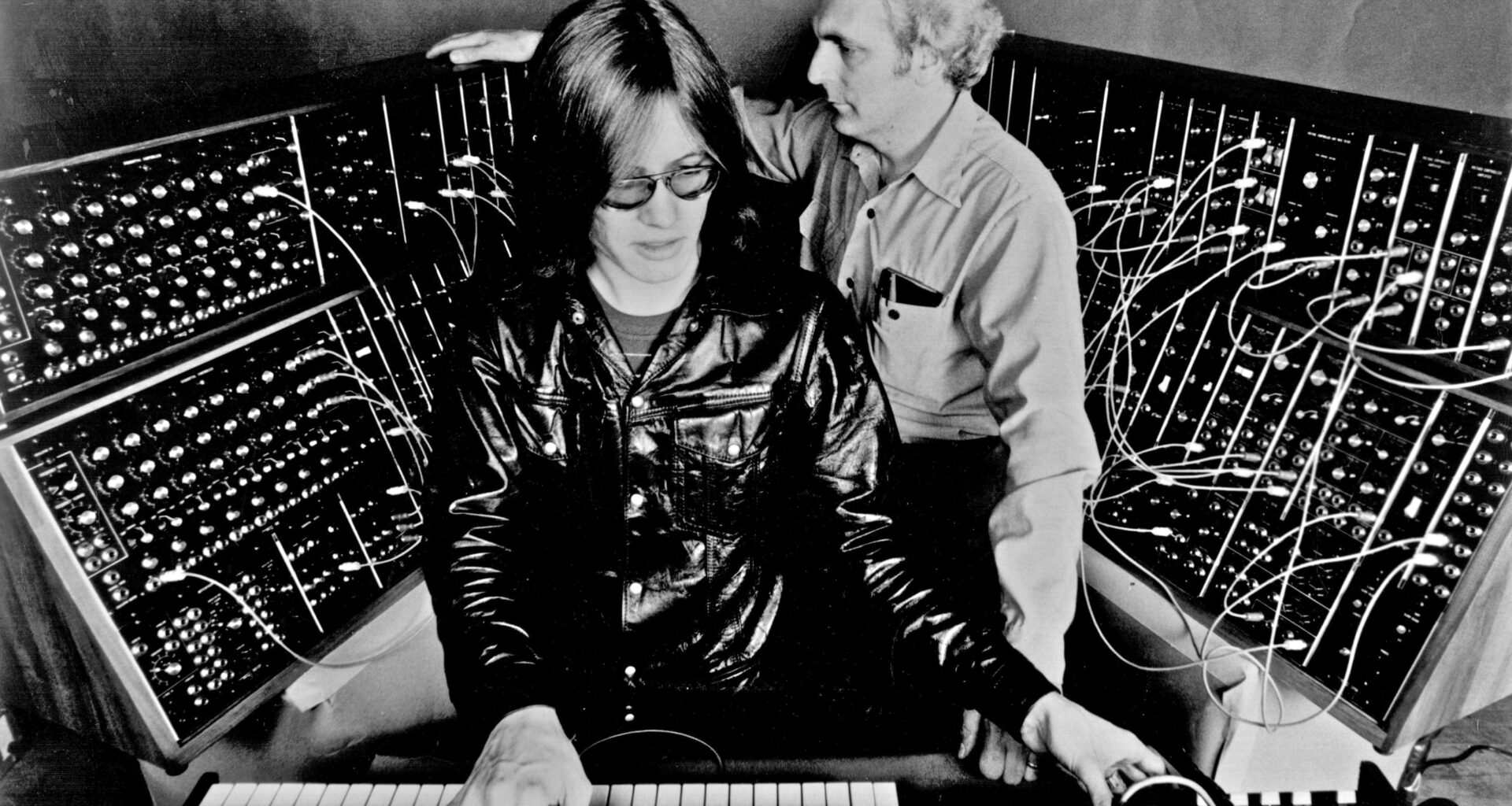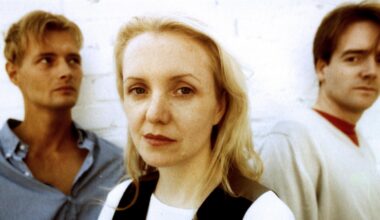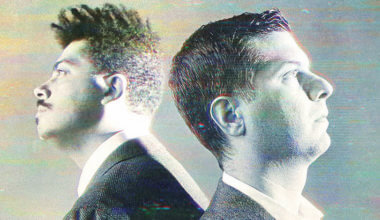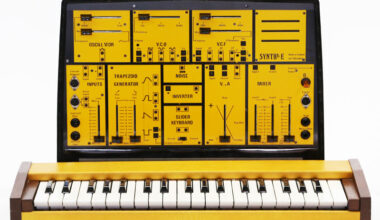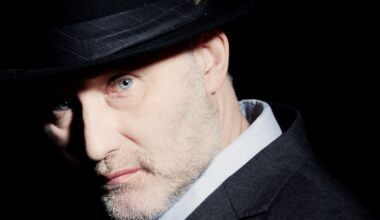We all know him as Robert Moog, the godfather of the synthesiser, a man whose role in the history of electronic sound cannot be overStated. But to Michelle Moog-Koussa, he was plain old Dad, who helped her with her piano lessons, chopped wood for the fire, and liked gardening and canoeing and star gazing. Ahead of a new documentary about Bob Moog that Michelle is putting together for release next year, we get a fascinating and highly personal insight into the everyday life of a legend
Thanks for talking to us, Michelle. Everyone knows Bob Moog as the inventor of the synthesiser, but what is your earliest memory of your father?
“The earliest memory I have of my father was from a family camping trip when I was three years old. We went canoeing – all six of us in one canoe – and my father carried the canoe on his head to the lake. I don’t remember how far that was, but I remember being very taken by his sense of responsibility to the family, his willingness to carry the heavy load, so to speak.”
When you think about your dad, are there any particular memories that stand out for you?
“When I was about five years old, I took piano lessons. I wasn’t doing very well and I could tell that my parents weren’t impressed. At the dinner table one night, I professed that I wanted quit. Quitting wasn’t really part of our family culture, so I must have felt quite defeated. The next day, my father sat down with me and asked me to play for him. I obliged him and bumbled through a song. He then took the sheet music away, replaced it with much larger notes that he had drawn, and asked me to play again. I got through the song with ease. I remember him calling out to my mother and saying, ‘I figured it out, she can’t see the notes’. Soon after that, I was diagnosed with a significant vision problem.
“This reflection encapsulates my father to me. Where most people might be quite reactive in this situation and make a dismissive assumption about talent, intelligence or commitment, my father cared enough to approach the problem with a sense of curiosity and with a goal designed to help improve the situation. I suppose this is partially due to his training as a scientist and an engineer. As a child, his ability to think very deliberately and outside the box, which ultimately leads to a thirst for discovery, was a powerful lesson for me.
“Another very fond memory came from many years later. When I was 14, I took a physical science class in high school. We were learning about the physics of pulleys and I needed some help understanding the concepts. So I went out to Dad’s workshop, which at that time was located right across the driveway, and asked for his help. Normally, he was very focused on his work and didn’t take kindly to being interrupted, but he hopped up from his bench and constructed a simple pulley system to show me how it worked. We were both on our knees, peering up at his creation as he manipulated it and carefully explained its functions. He was so present, so absorbed in the connection between us. He was insatiably curious and extremely knowledgeable, which made him a great teacher.”
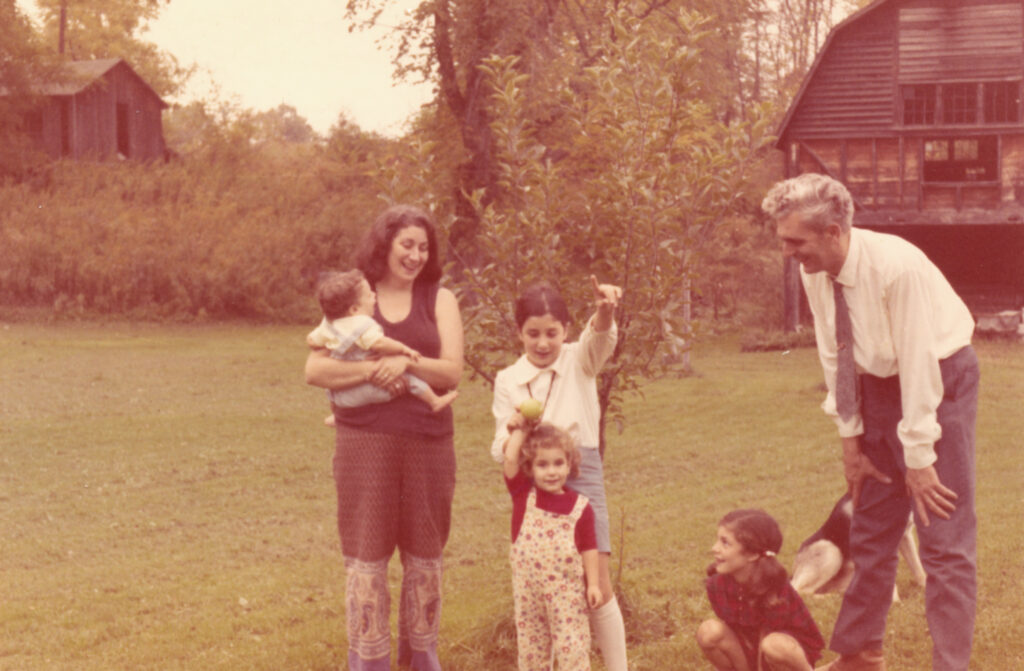
There were four children in the Moog household, three girls and a boy. Can you describe life chez Moog as you were growing up?
“Our family life was somewhat typical for those days. Mom devoted herself to the care of the family full time. Dad worked a lot and travelled a fair amount, but we always saw him at mealtimes. My mother was an amazing cook, so meals together were a time for enjoyment and bonding. My older sisters, Laura and Renee, are seven and five years older than me, and I am two years older than my brother Matthew. My big sisters helped take care of Matthew and me when we were younger.
“If there’s one thread that I would identify in our upbringing, it was self-sufficiency. We were taught to be responsible for ourselves at a young age. We all learned to do our own laundry by the time we were six or seven and we all learned to cook starting at the age of seven. I can remember turning seven and Dad teaching me how to cook eggs. It was quite the rite of passage. As we got older, all of us were expected to cook and bake to help alleviate some of that responsibility from my mother.
“Gardening was also a big part of the family culture. When I was 10, we moved to North Carolina, where my parents had a large vegetable garden. The three younger kids used to help maintain the garden throughout the summer, sometimes working 30 to 40 hours a week.”
The house in North Carolina was unique. Can you tell us about it and how it came about?
“This was 1978, just after Dad had left Moog Music in Buffalo, New York state. His patience for corporate life had expired. Seven years prior to that, he had been almost bankrupt and had sold his original company, RA Moog Co, to a venture capitalist. He never had much in common with the guy who took over ownership of the company, which was renamed Moog Music and moved from the bucolic Trumansburg to the more industrial Buffalo.
“It was from this perspective that he and my mother decided to get as far away from corporate life as possible, seeking out the natural beauty of Asheville, North Carolina, as a place to live with more balance and integrity. They purchased 89 acres of unspoiled mountainous land at the end of a dead-end road about 20 miles outside of Asheville. There they built a 15-sided round home. The shell was constructed in the summer of 1978, while our family lived in a 100-year-old log cabin a few hundred yards away from the property.
“My parents took a year and a half to finish the house. They did it themselves, with the help of three skilled carpenters. Mom and Dad did all the tiling, Dad did all the plumbing and the wiring of the house, and we laid all the floors as a family. The house was heated only with wood, which Dad usually chopped himself. The water was provided by two mountain springs and there was a root cellar, where my mother would can the vegetables from the garden. The house also had a large wrap-around deck, where we spent a lot of time as a family. It was very isolated, but very beautiful.”
Bob Moog lost the right to use his name when he left Moog Music. That must have been a bitter moment, but then getting it back many years later must have been a sweet victory. Can you describe your father’s feelings about each of those events?
“That wasn’t the first major loss that he endured. The first came when he sold RA Moog Co and the name was changed to the less personal Moog Music. My father was eventually removed from the synthesiser design team and relegated to designing foot pedals for Maestro and amps for Gibson. As he so succinctly put it, ‘They didn’t know how to use my talents any more’. So the inability to use his own name for his own purposes wasn’t entirely new to him.
“I was only 10 years old when he lost the use of his name, so I didn’t really know what had happened. What I did know was that my parents were very happy to be leaving Buffalo and the toxic corporate culture at Moog Music, and that any concessions my father made were balanced by the freedom he gained to separate himself from corporate life and pursue projects that were creative and innovative.
“As an adult, I can remember the legal struggle Dad went through to get his name back and the significant financial toll that it took. By the time he finally got the name back, he was almost broke once again. He seemed happy to have the name back, but exhausted by the process of doing so.”
As an entrepreneur inventor, your dad wasn’t alone in facing financial difficulties – Peter Zinovieff and EMS in London, for example. Do you remember that impacting life at home?
“There were times of financial struggle throughout Dad’s career, although they were interspersed with periods of financial stability. During the low periods, he was often tense, as you would expect, and would work even longer hours than usual. That made things at home more stressful for everybody, particularly my mother. But Dad almost always managed to find some kind of solution – moving to Boston and taking a job with Kurzweil in 1985 was one such solution – so those periods never lasted more than a year or so.”
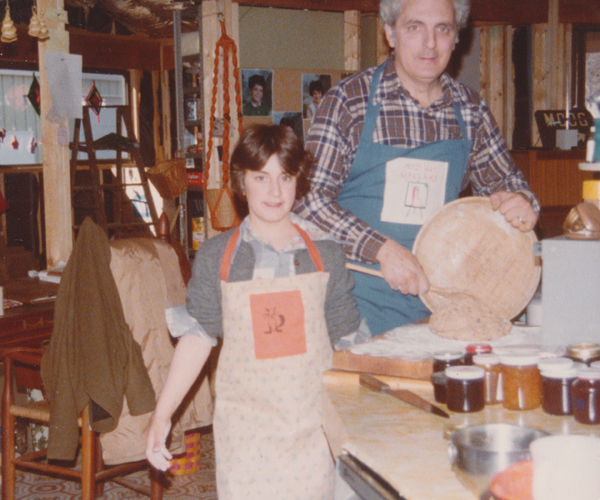
Were you interested in the products your dad was creating? Was there a Moog Modular or a Minimoog in the house that you could play with?
“There was never a synthesiser in the house until Dad began working for Kurzweil. He brought home a K-250 for a short period of time. I remember being curious, but daunted by it. I think all of us kids were interested in Dad’s work to some extent, but talking about it was never encouraged, so it was rarely discussed.”
Outside of music, what sort of things did he enjoy doing? How did he relax?
“Dad loved spending time in nature. As well as gardening, he liked hiking and canoeing. He liked hunting for mushrooms and bird watching and star gazing. He became a scout at a fairly young age and eventually became an Eagle Scout. I think that experience instilled not only a love of nature in him, but an understanding of the balance it provides to life’s stresses. He also enjoyed reading and sharing a good meal with friends. He relished what are often called the simple pleasures of life.”
Bob Moog was just “Dad” to you and your siblings. Can you remember a point when you realised how revered your father was? Did it come during your childhood or much later?
“When I was about four or five years old, my father was on a television show called ‘To Tell The Truth’. We weren’t allowed to watch much TV in my family, but my mother sat us all down to watch that. Seeing my father on TV was surreal in and of itself, but at the end of the show, the announcer said, ‘Will the real Robert Moog please stand up?’, and Dad stood up. That was a weird moment, where I was forced to recognise that my dad was this famous person named Bob Moog.
“I had a few more experiences like that in my childhood, but it was relatively easy to keep them pushed to the periphery of my mind and stay focused on my dad. Then in 1990, when I was 22, I attended my first NAMM event with him. Many things happened there, but the most memorable was when someone dropped to their knees in front of Dad and started raving about how he was his idol, how he’d changed the world of music, and so on. That made my father, whose humility is legendary, quite uncomfortable, but it was a step towards me realising the enormity of the Bob Moog side of him.
“It wasn’t until Dad passed away in 2005 and we received thousands of testimonials from all over the world saying how he had touched people’s lives, and in some cases transformed lives, that I began to have a true understanding of the magnitude and depth of his impact. That period of time, which spanned a few weeks, was a dawning for me. The walls that had been, consciously or unconsciously, built in my family to keep Bob Moog at bay came crashing down, and the reality of what my father meant to people was suddenly staring me in the face. It was quite overwhelming.”
You’ve teamed up with Robert Fantinatto and Jason Amm, the guys behind the superb ‘I Dream Of Wires’ documentary, to make a film about your father called ‘Electronic Voyager’. Can you tell us how the project got started and what the finished film will be like?
“Robert, Jason and I share a passion for exploring and understanding the man behind the Bob Moog icon. Most people know very little about what he was like as a person. From Robert and Jason’s viewpoint, telling that story through the intimate lens of a daughter’s eyes was the perspective with the most integrity.
“They approached me with the idea and I loved their vision of retracing Dad’s life journey by interviewing a wide range of his colleagues and friends. With this approach, we not only learn about Bob Moog as a person, but we begin to understand the wonderful and important network of people he worked with, people who accepted him for just being Bob. Without a doubt, this documentary will reveal the yet unexplored many facets of my father, which go far beyond his accomplishments as Bob Moog.”
Since your father’s passing, you’ve been running the Bob Moog Foundation. What is the aim of the foundation and what are its plans for the future?
“The Bob Moog Foundation carries on Bob’s pioneering work by inspiring people through the intersection of music, science and innovation. Our two main projects are Dr Bob’s SoundSchool, a 10-week experiential curriculum through which we teach elementary school students about the science of sound, and the preservation of the Bob Moog Foundation Archives. Our vision is to grow Dr Bob’s SoundSchool throughout the United States and to create a complementary set of online educational tools that can be accessed internationally. Our plans also include preserving and sharing the vast array of archival material through travelling exhibits and online assets.”
What do you think is Bob Moog’s lasting legacy?
“It is most certainly a legacy of inspiring legions of people all over the world through a combination of technical brilliance and creative warmth. It is also a legacy of commitment, determination, and a dedication to being a humanist. Bob Moog brought people together through the music he helped create. I think that would be his proudest accomplishment.”
For more information visit electronicvoyager.com
